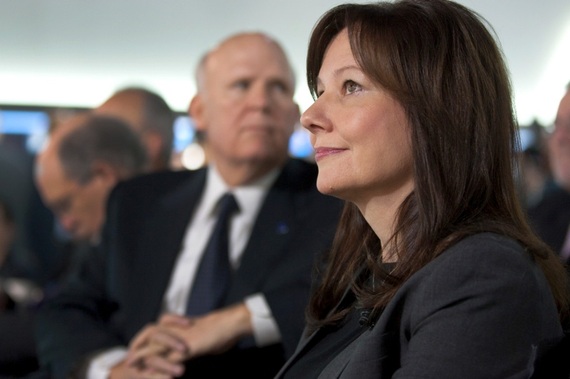Ever since the days of Henry Ford, few industries have been more male-dominated at the executive level than the auto industry.
Former GM Vice Chairman Bob Lutz fittingly titled his recent book Car Guys vs. Bean Counters: The Battle for the Soul of American Business. When it comes to top executives at auto companies, there simply hasn't been a woman in the driver's seat, ever.
Until now, that is.
Mary Barra's appointment as CEO of General Motors is clearly a milestone for both women and the auto industry. This is a business, after all, where it's more likely to see a woman draped across a car hood at an auto show or in a pin-up calendar than sitting in the executive suite.
But here's something to know about the auto industry's first woman CEO: She didn't get the job because she's a woman. She got the job because she made things happen for her; she didn't wait for things to happen to her.
Barra, 51, whose father was a Pontiac die tool maker and whose mother was a bookkeeper, started working at General Motors when she was just 18.
She worked her way up a variety of engineering jobs at GM, eventually becoming VP of global manufacturing engineering. Then, backed by forward-thinking bosses, she earned the opportunity to bolster her management experience by running GM's human resources, product development, purchasing and supply chain operations.
In a nutshell, Mary Barra did everything she needed to do to be GM's CEO before she was appointed to the top job. She learned her industry; she made a plan and set a path for her career; she formed a team of supporters and mentors to help guide her along the way -- and she worked hard to get there.
We should all applaud her achievement, and the revolutionary change her appointment brings to the auto industry.
But we should also remember that most women -- many of whom are just as qualified, just as hard-working, just as dedicated as Mary Barra -- are more likely to be shut out of the running for corporate CEO positions than welcomed.
The same week Barra was appointed CEO of GM, the nonprofit research group Catalyst released its annual study of women in executive positions and on corporate boards at Fortune 500 companies.
For the eighth year in a row, the numbers were unchanged.
You read that right. Women still hold less than 17 percent of corporate board seats, and less than 15 percent of executive positions at the biggest companies in America.
"It's hard to believe that at the end of 2013 we still see more than a few all-male corporate boards and leadership teams," Ilene Lang, president and CEO of Catalyst said in announcing the results. "Diverse business leadership and governance are correlated with stronger business performance, employee engagement, and innovation.
"Shareholders beware: a company with no women at the top is missing one of the biggest opportunities in the marketplace today," she said.
Fortunately, there are a few companies that recognize it makes sense -- financially, socially, otherwise -- to have women in executive and board roles in a country where women make the majority of buying decisions.
Along with GM, another company helping to push equality in its executive ranks is Kimberly-Clark Corp. Four out of 10 executive officers at Kimberly-Clark are women, and 25 percent of the company's board seats are held by women.
"Companies that have improved their representation of women are attractive employers to all the talent available," Kimberly-Clark Corp. chairman and CEO Thomas Falk told Catalyst. "For those that have not improved, you have to wonder how long they can be successful if they are only hiring from half of the talent available.
"This issue is not about equity or fairness, it's about winning," Falk said.
Hopefully, more companies will follow the lead of GM and Kimberly-Clark.
Until then, we as women should follow the lead of Mary Barra. We should continue to make things happen for us, not to us. We should set our own course, build our team of supporters, and work hard to get to where we know we deserve to be.
Mary Barra photo courtesy of GM
